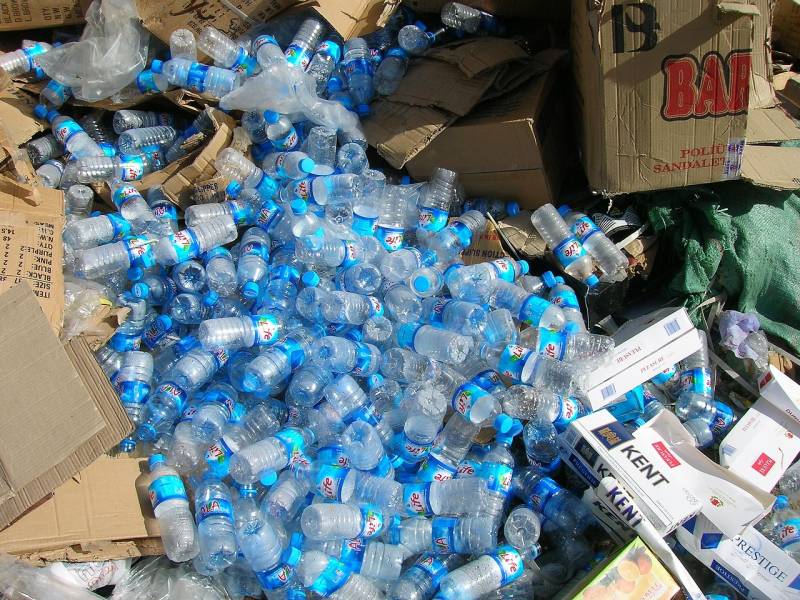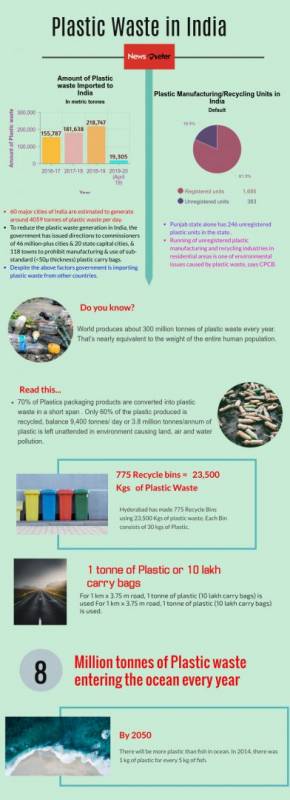Is India turning into a huge plastic dumpyard of world?
By Samanth Lanka
Hyderabad: Despite an immense 25 thousand tonnes of plastic waste being generated in India every day, in 2018-19, India imported around 2.1 lakh metric tonnes of plastic waste.
The average production/consumption of plastic products during the years 2011-12 to 2015-16 (up to September 2015) was 707 million metric tons per annum with the growth rate of 8.3 per cent per year in chemical and chemical products sector.
Some 1,685 registered manufacturing/recycling has been established to process the plastic waste generated in every state. One of the significant factors listed by CPCB about the environmental issues caused by plastic waste is running of unregistered plastic manufacturing and recycling industries in residential areas.
India still has 383 unregistered plastic manufacturing units. Punjab alone has 246 unregistered plastic units in the state.

The CPCB in its guidelines for collection, segregation and disposal of plastic waste has prescribed for technological solutions including utilization of plastic waste in road construction, co-processing in cement kilns, conversion of plastic waste into refused derived fuel (RDF) and disposal of plastic waste through Plasma Pyrolysis Technology.
Jeevanand Reddy, an environmentalist, while talking to Newsmeter about plastic waste in India said, “Internationally, all the experts are suggesting that instead of recycling the plastic, it can be incinerated so that the plastic waste can be used for road construction.”
Hyderabad is the seventh-largest city generating around 200 tonnes of plastic waste. “Initially the government said they will construct 2 km road using plastic waste near Mehedipatnam. But till now there is no sign of activity,” said Jeevanand.
“Our municipalities talk about only plastic carry bags. In Hyderabad, there are several illegal plastic cover manufacturing units which run without permission in residential areas. Dumping of plastic waste in water bodies is one of major hazard to the environment and aquatic life,” Jeevanand said.
According to Jeevanand, in many countries, for constructing a house, instead of the traditional method, people use plastic for construction, which is lightweight. In the Chennai port, many people import a huge quantity of old computers in the name of donation to poor people. But along with that they bring plastic waste and dump here. One such place is Gujarat and now in Andhra coast also.
To tackle the challenge of an increased quantity of plastic waste, the Government of India, in 2018, amended the Plastic Waste Management Rules, 2016. Central Pollution Control Board (CPCB) in an official statement said, “Andhra Pradesh and Telangana have not provided information on the state plastic waste management.”
It’s not only AP and Telangana not providing the details, but 12 other State Pollution Control Boards (SPCB) /UTs which are also not providing the data of their plastic waste management.
There are 35 State Pollution Control Boards /UTs under the Central Pollution Control Board. According to CPCB, only 21 SPCBs/UTs have submitted their data on plastic waste management. The data for the remaining 14 SPCBs/ UTs is not available with the central government.
To make the SPCBs work stringent, the Central government has amended Plastic Waste Management Rules, 2016 as amended in 2018. According to this rule, each State Pollution Control Board or Pollution Control Committee shall prepare and submit the Annual Report to the Central Pollution Control Board on the implementation of these rules by July 31 every year.
Recently the government announced a ban on six plastic items from October 2. “Let us see the plastic ban from October 2. It is very different from giving statements and make it happen in reality. Unless you solve the major problem of reducing plastic waste, there is no point of asking to avoid using plastic,” he added.
United Nations, in an official statement, said, “Today, we (world) produce about 300 million tonnes of plastic waste every year. That’s nearly equivalent to the weight of the entire human population.”
Only 9% of all plastic waste ever produced has been recycled. About 12% has been incinerated, while the remaining 79% has accumulated in landfills, dumps or the natural environment.
United Nations, in an official statement, said, “Today, we (world) produce about 300 million tonnes of plastic waste every year. That’s nearly equivalent to the weight of the entire human population.
Only 9% of all plastic waste ever produced has been recycled. About 12% has been incinerated, while the remaining 79% has accumulated in landfills, dumps or the natural environment.